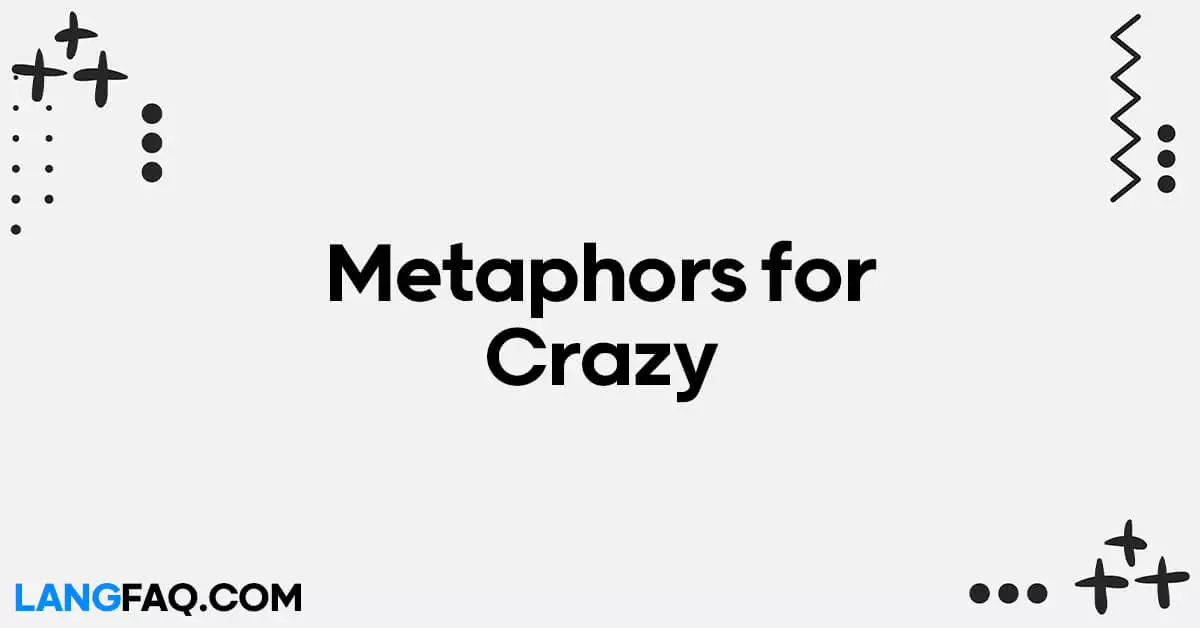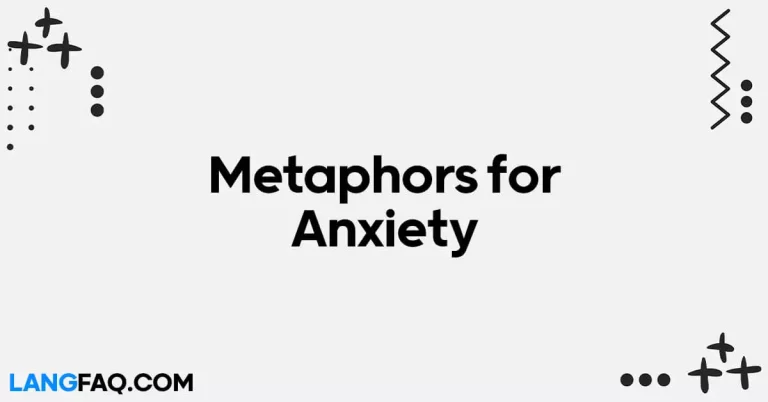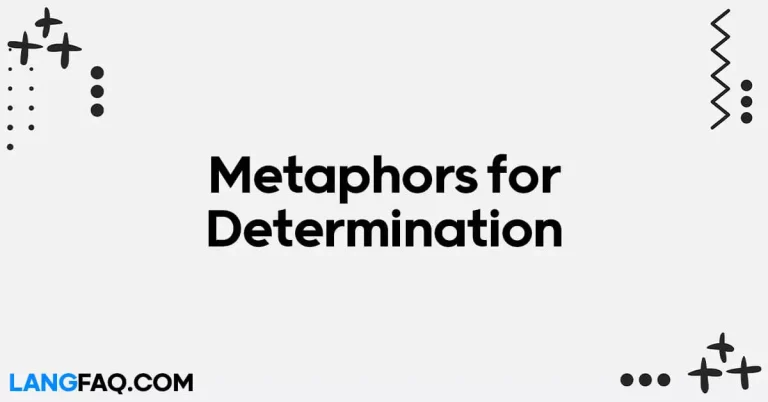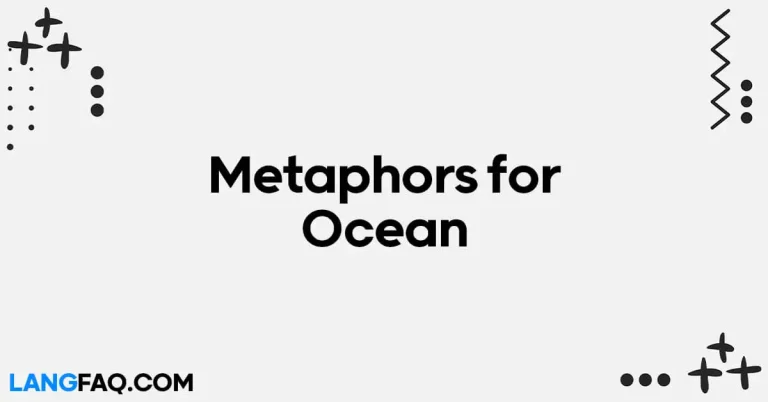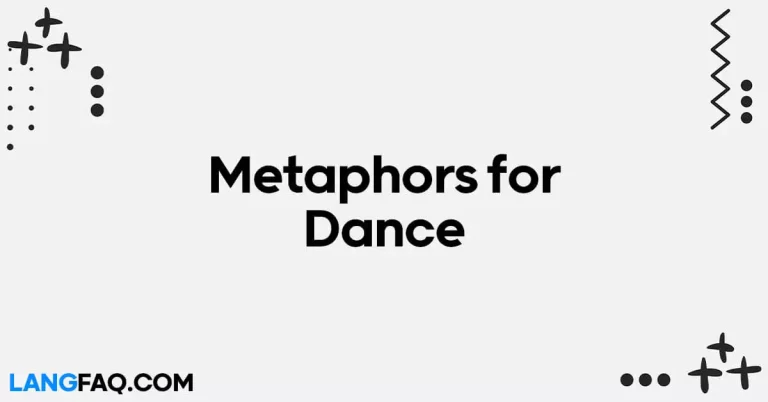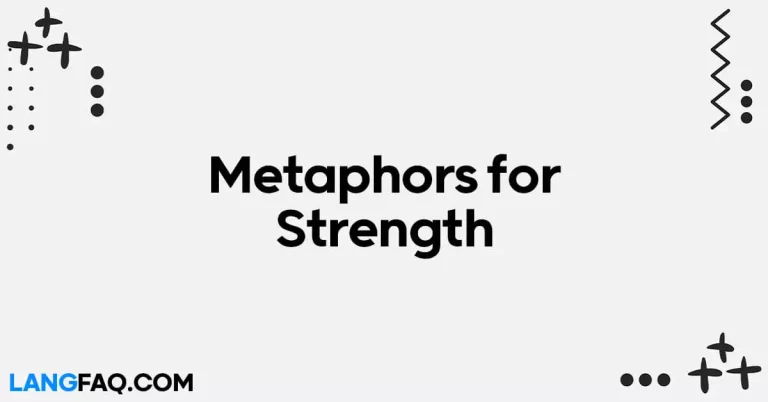Craziness, eccentricity, or madness—call it what you will, but it’s a concept that has fascinated us for generations. People have devised a multitude of metaphors to encapsulate the unique and often perplexing nature of eccentric behavior. These metaphors not only add depth to our language but also help us relate to and describe the eccentricities of those around us.
In this article, we’ll take a journey through 26 metaphors for crazy, each one shedding light on the peculiar ways people can behave. From the “wild as a March hare” to “bats in the belfry,” we’ll explore the origins, meanings, and nuances of these metaphors. By the end, you’ll have a newfound appreciation for the richness of language and the diversity of human expression.
26 Metaphors for Crazy
- As nutty as a fruitcake: Describing someone as unpredictable or eccentric, much like the haphazard inclusion of various nuts and fruits in a fruitcake.
- Crazy as a loon: Referring to someone exhibiting bizarre or irrational behavior, inspired by the unpredictable nature of loons.
- Mad as a hatter: Originating from the hat-making industry, it describes eccentric or irrational behavior due to exposure to mercury.
- Nuttier than a squirrel’s stash: Depicting someone whose eccentricity knows no bounds, akin to squirrels hoarding nuts in peculiar places.
- Off one’s rocker: Describing someone as behaving bizarrely or irrationally, often associated with mental instability.
- Bonkers: Signifying someone as crazy or extremely eccentric, often in a lighthearted way.
- Dotty as a donut: Likening eccentricity to the delightful randomness of sprinkles on a donut.
- Cuckoo: Derived from the cuckoo bird’s call, used to describe someone who’s a bit unhinged or eccentric.
- Round the bend: Signifying someone has gone beyond the limits of normalcy and sanity, acting erratically.
- Loopy: Referring to someone acting peculiarly or eccentrically, often in a whimsical or endearing way.
- Nutcase: Directly stating someone is crazy, emphasizing pronounced eccentricities.
- Wacky as a rubber chicken: Portraying someone with a zany sense of humor or eccentric behavior, akin to the absurdity of rubber chickens.
- Bats in the belfry: Describing someone as a bit crazy or eccentric, with the image of bats flying chaotically in a bell tower.
- Off the deep end: Signifying someone has acted in an extreme and irrational manner.
- Two sandwiches short of a picnic: Humorously suggesting someone lacks a few mental “sandwiches” for a complete picnic, indicating eccentricity.
- Out to lunch: Implying someone is mentally absent or disengaged, often due to eccentricity.
- Not playing with a full deck: Suggesting someone is missing some essential mental cards, making them behave eccentrically.
- Cracked as a porcelain teapot: Describing someone as mentally fragile or eccentric, akin to the fragility of porcelain teapots.
- A few fries short of a Happy Meal: Playfully likening eccentricity to a missing few fries from a fast-food Happy Meal.
- Lost one’s marbles: Signifying someone has become irrational or eccentric, often due to age or stress.
- As wild as a March hare: Likening eccentricity to the erratic behavior of March hares during breeding season.
- Riding the crazy train: Capturing someone’s unpredictable and eccentric behavior, akin to a train hurtling along, out of control.
- Gone bananas: Describing someone as crazy or eccentric, often in a humorous context.
- One brick short of a load: Humorously suggesting someone is missing a brick from their mental load, making them behave eccentrically.
- Singing a different tune: Signifying someone has a unique perspective or behaves eccentrically.
- Marching to the beat of a different drum: Celebrating individuality and eccentricity, suggesting that some people have their own unique way of doing things.
As Nutty as a Fruitcake
Definition: Describing someone as unpredictable or eccentric, akin to the haphazard inclusion of various nuts and fruits in a fruitcake.
Usage: This metaphor adds a touch of whimsy to conversations. It’s suitable for informal contexts among friends or family when playfully teasing someone about their quirks.
Example Sentence: “You know Sarah, she’s as nutty as a fruitcake. Yesterday, she showed up at the party wearing mismatched shoes!”
Variations:
- As zany as a fruitcake: A more lighthearted variant for a casual tone.
- Eccentric as a fruitcake: A formal variation when discussing eccentric behavior in a professional setting.
Pros:
- Evokes humor and light-heartedness.
- Easily understood by a broad audience.
Cons:
- May be perceived as a bit clichéd if overused.
Crazy as a Loon
Definition: Referring to someone exhibiting bizarre or irrational behavior, inspired by the unpredictable nature of loons.
Usage: This metaphor can be used both informally and formally. It’s effective when discussing eccentricity without being overly playful.
Example Sentence:
- Informal: “I can’t believe he quit his job to become a professional juggler. He’s crazy as a loon!”
- Formal: “Her unorthodox approach to problem-solving is often viewed by her colleagues as ‘crazy as a loon’.”
Variations:
- Quirky as a loon: A lighter version suitable for casual conversations.
- Irrational as a loon: A more formal variant for professional discussions.
Pros:
- Strong imagery with the reference to loons.
- Versatile usage in different contexts.
Cons:
- Might be considered insensitive in some situations.
Mad as a Hatter
Definition: Originating from the hat-making industry, it describes eccentric or irrational behavior due to exposure to mercury.
Usage: This metaphor can be employed in both formal and informal contexts, making it adaptable to various situations.
Example Sentence:
- Informal: “His obsession with collecting vintage teacups is making him ‘mad as a hatter’!”
- Formal: “The decision to launch the new product without market research seems a bit ‘mad as a hatter’ considering the risks involved.”
Variations:
- Eccentric as a hatter: A more formal tone.
- Irrational as a hatter: Suitable for professional discourse.
Pros:
- Historical reference adds depth.
- Can be used in both light-hearted and serious discussions.
Cons:
- Some may not understand the historical context.
Nuttier than a Squirrel’s Stash
Definition: Depicting someone whose eccentricity knows no bounds, akin to squirrels hoarding nuts in peculiar places.
Usage: This metaphor is best suited for informal, light-hearted conversations where humor is appreciated.
Example Sentence: “His idea of organizing the office supplies is nuttier than a squirrel’s stash. Who keeps pens in the fridge?”
Variations:
- Crazier than a squirrel’s stash: For a more intense description.
- Quirkier than a squirrel’s stash: A lighter version for less eccentric situations.
Pros:
- Engaging and humorous.
- Creates a vivid mental image.
Cons:
- Not suitable for formal or professional discussions.
Off One’s Rocker
Definition: Describing someone as behaving bizarrely or irrationally, often associated with mental instability.
Usage: This metaphor is versatile and can be used in both formal and informal contexts when discussing eccentric behavior with a touch of concern.
Example Sentence:
- Informal: “After spending hours talking to his pet cactus, we thought he might be off his rocker!”
- Formal: “The CEO’s sudden decision to rebrand the company raised concerns among shareholders; some even considered him ‘off his rocker’.”
Variations:
- Eccentric as a rocker: A formal alternative.
- Irrational as a rocker: Suitable for professional settings.
Pros:
- Strong imagery with the rocking chair reference.
- Can convey concern effectively.
Cons:
- May perpetuate stigma around mental health if used insensitively.
Bonkers
Definition: Signifying someone as crazy or extremely eccentric, often in a lighthearted way.
Usage: “Bonkers” is informal and best used among friends or in casual conversations.
Example Sentence: “You have to meet my cousin; he’s absolutely bonkers! He once tried to set a world record for eating the most pancakes in an hour.”
Variations:
- Utterly bonkers: For added emphasis.
- Completely bonkers: A slightly formalized version.
Pros:
- Simple and easily understood.
- Adds a touch of playfulness to the conversation.
Cons:
- May not be suitable for serious discussions or professional settings.
Dotty as a Donut
Definition: Likening eccentricity to the delightful randomness of sprinkles on a donut.
Usage: This metaphor is whimsical and best reserved for informal conversations among friends or when playfulness is appreciated.
Example Sentence: “Her fashion sense is as dotty as a donut. She’s always mixing polka dots with stripes!”
Variations:
- Eccentric as a donut: A more formal option for casual professional discussions.
- Quirky as a donut: A lighter, less intense version.
Pros:
- Invokes a delightful and colorful mental image.
- Adds a touch of humor.
Cons:
- Not suitable for serious or formal conversations.
Cuckoo
Definition: Derived from the cuckoo bird’s distinctive call, this term is used to describe someone who’s a bit unhinged or eccentric.
Usage: “Cuckoo” can be used informally among friends or family but should be avoided in professional contexts due to its potential insensitivity.
Example Sentence: “His conspiracy theories are making him sound cuckoo. He believes aliens are living in his garage!”
Variations:
- Crazier than a cuckoo: For added intensity.
- Quirkier than a cuckoo: A lighter, less intense version.
Pros:
- Clear reference to the cuckoo bird’s behavior.
- Easy to understand.
Cons:
- May be perceived as derogatory if used insensitively.
Round the Bend
Definition: Signifying someone has gone beyond the limits of normalcy and sanity, acting erratically.
Usage: This metaphor can be used informally and formally, depending on the context. It’s versatile and effective in conveying a sense of eccentricity.
Example Sentence:
- Informal: “Ever since he started collecting garden gnomes, he’s gone ’round the bend’!”
- Formal: “The sudden change in the company’s direction left many employees feeling like the management had gone ’round the bend’.”
Variations:
- Eccentric as a bend: A more formal variant.
- Irrational as a bend: Suitable for professional discussions.
Pros:
- Evokes the idea of a continuous, unpredictable journey.
- Applicable in various contexts.
Cons:
- Might be seen as clichéd if overused.
Loopy
Definition: Referring to someone acting peculiarly or eccentrically, often in a whimsical or endearing way.
Usage: “Loopy” is informal and best used among friends or in casual conversations.
Example Sentence: “Her stories always take a loopy turn. Last night, she insisted she could talk to plants!”
Variations:
- Quirky as a loop: A slightly more formal version for informal professional discussions.
- Eccentric as a loop: A formal option.
Pros:
- Simple and easy to grasp.
- Adds a touch of affection to the description.
Cons:
- May not be suitable for serious or professional discussions.
Nutcase
Definition: A more direct way of saying someone is crazy, a “nutcase” is someone whose eccentricities are pronounced.
Usage: “Nutcase” is informal and may be used among friends or in casual conversations.
Example Sentence: “You won’t believe what he did this time. He’s a total nutcase! He built a robot to feed his goldfish!”
Variations:
- Utter nutcase: For added emphasis.
- Complete nutcase: A slightly more formalized version.
Pros:
- Straightforward and impactful.
- Clearly conveys eccentricity.
Cons:
- Not suitable for formal or professional discussions.
Wacky as a Rubber Chicken
Definition: Portraying someone with a zany sense of humor or eccentric behavior, akin to the absurdity of rubber chickens.
Usage: This metaphor is informal and best suited for playful conversations among friends or when humor is appreciated.
Example Sentence: “His comedy routine is as wacky as a rubber chicken. You never know what he’s going to do next!”
Variations:
- Crazier than a rubber chicken: For added intensity.
- Quirkier than a rubber chicken: A lighter, less intense version.
Pros:
- Creates a vivid and humorous mental image.
- Adds an element of fun to the conversation.
Cons:
- Inappropriate for formal or serious discussions.
Bats in the Belfry
Definition: This phrase paints a vivid image of bats flying chaotically in a bell tower. It’s used to describe someone who’s a bit crazy or eccentric.
Usage: “Bats in the belfry” can be used informally among friends or in light-hearted discussions.
Example Sentence: “His obsession with collecting rubber ducks has me convinced there are bats in the belfry!”
Variations:
- Crazier than bats in the belfry: For added emphasis.
- Quirkier than bats in the belfry: A lighter, less intense version.
Pros:
- Evokes a vivid and memorable image.
- Adds humor to the description.
Cons:
- Not suitable for formal or professional conversations.
Off the Deep End
Definition: Signifying someone has acted in an extreme and irrational manner.
Usage: “Off the deep end” can be used both informally and formally when discussing eccentric behavior with a sense of gravity.
Example Sentence:
- Informal: “When he found out his favorite show was canceled, he went ‘off the deep end’ and wrote a 10-page letter to the network!”
- Formal: “Her decision to invest the entire budget in a risky startup seemed like going ‘off the deep end’ to many board members.”
Variations:
- Eccentric as the deep end: A more formal alternative.
- Irrational as the deep end: Suitable for professional discussions.
Pros:
- Evokes a sense of depth and extremeness.
- Adaptable to various contexts.
Cons:
- May be seen as clichéd if overused.
Two Sandwiches Short of a Picnic
Definition: Humorously suggesting someone lacks a few mental “sandwiches” for a complete picnic, indicating eccentricity.
Usage: This metaphor is light-hearted and best used among friends or in playful conversations.
Example Sentence: “His conspiracy theories make me think he’s ‘two sandwiches short of a picnic.’ Yesterday, he claimed the moon landing was filmed in his neighbor’s backyard!”
Variations:
- Crazier than two sandwiches short of a picnic: For added intensity.
- Quirkier than two sandwiches short of a picnic: A lighter, less intense version.
Pros:
- Humorous and memorable.
- Invokes a playful tone.
Cons:
- Not suitable for formal or serious discussions.
Out to Lunch
Definition: Being “out to lunch” implies that someone is not mentally present or engaged, often due to eccentricity.
Usage: This metaphor can be used informally among friends or in a slightly formal context when discussing eccentric behavior with a touch of concern.
Example Sentence:
- Informal: “During the meeting, he was completely ‘out to lunch.’ He was doodling aliens in his notebook!”
- Formal: “Her tendency to be ‘out to lunch’ during important negotiations is a concern for the team.”
Variations:
- Eccentric as being out to lunch: A more formal variant.
- Irrational as being out to lunch: Suitable for professional discussions.
Pros:
- Easy to understand.
- Can convey concern effectively.
Cons:
- May be seen as clichéd if overused.
Not Playing with a Full Deck
Definition: This metaphor suggests that someone is missing some essential mental cards, making them behave eccentrically.
Usage: “Not playing with a full deck” is versatile and can be used informally and formally when discussing eccentricity.
Example Sentence:
- Informal: “His decision to quit his job and travel the world without a plan proves he’s ‘not playing with a full deck’!”
- Formal: “The project’s success relies on teamwork, and we can’t afford anyone who’s ‘not playing with a full deck’.”
Variations:
- Eccentric as not playing with a full deck: A more formal tone.
- Irrational as not playing with a full deck: Suitable for professional discussions.
Pros:
- Strong imagery with the reference to a deck of cards.
- Applicable in various contexts.
Cons:
- Might be perceived as clichéd if overused.
FAQs
What is the origin of the phrase “mad as a hatter”? The phrase “mad as a hatter” originated from the hat-making industry, where workers were exposed to mercury, leading to neurological damage and eccentric behavior.
Is calling someone “crazy as a loon” offensive? It can be seen as offensive, so it’s essential to use such phrases with sensitivity and context in mind.
Why do we use metaphors to describe eccentric behavior? Metaphors add depth and color to our language, helping us understand and communicate complex ideas and behaviors.
Are these metaphors considered formal language? No, many of these metaphors are informal or colloquial expressions used in everyday conversation.
Can eccentric behavior be a sign of mental illness? Yes, eccentric behavior can sometimes be a sign of underlying mental health issues, so it’s important to approach it with empathy and support.
What’s the difference between being eccentric and being mentally ill? Eccentricity is often characterized by unconventional or unique behavior, while mental illness involves more serious and clinically significant disturbances in thought, emotion, or behavior.
Conclusion
Language is a fascinating tool, and metaphors for crazy remind us of its versatility. From comparing someone to a nutty fruitcake to suggesting they’re as wild as a March hare, these expressions add depth and color to our descriptions of eccentric behavior.
So, the next time you encounter someone who’s a bit “off the deep end” or “as nutty as a fruitcake,” you’ll have a whole array of metaphors at your disposal to capture their unique essence.

